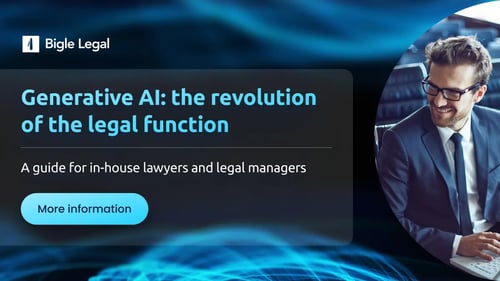AI for lawyers - Frequently Asked Questions
Since generative AI landed in our lives, many see it as a tool to free humans from routine tasks and increase productivity, which would push the legal department to digitise more easily. But large AI companies raise questions about the privacy of the data entered or the veracity of the answers (first tip: generative AI does not think, or in other words, it does not know if it is wrong, you can't trust what it tells you 100%!), so, in this article, we bring you the answer to five frequently asked questions about AI for lawyers.
Let's get started!
What do we know about popular generative AI? Some examples of popular generative AI systems are the well-known ChatGPT, a chatbot that answers text questions in a surprisingly human way, DALL-E, which can create vivid and realistic images from prompts, and Consensus, a specific tool to search for verified and reliable information. But what about the legal sector? Yes, this can also benefit from generative AI: lawyers deal with various tasks that involve creating, reviewing, analysing and collaborating on contracts, legal documents and other writings. These tedious tasks are time-consuming and subject to manual errors, where generative AI can lend a useful hand.
In this article, you will find:
- How can I assess the quality and reliability of generative AI tools for lawyers?
- How can I improve my skills and knowledge in using generative AI tools for lawyers?
- What are the best practices when using generative AI for lawyers?
- What are the risks and challenges of generative AI for lawyers?
- What future trends and developments await generative AI for lawyers?
How can I assess the quality and reliability of generative AI tools for lawyers?
To assess the quality and reliability of AI solutions that catch your attention, first check their sources, methods and results. Look for tools that use reputable and relevant data sources, such as official databases, journals or publications. Another important aspect is how they work: go for those that use transparent and rigorous methods, such as tested and reliable algorithms, models or techniques. In addition, it is more than advisable (we could say mandatory) to always read their terms and conditions, privacy policies and legal notices before using them.
You might be interested in: How to apply AI in legal tech: what can it do for lawyers?
Finally, and most importantly, look for AI solutions that are specific to the legal sector. Generative AI is a great ally but, be careful, it can be fed by generic information and databases that may even have an outdated time limit if they are not properly updated and monitored. Therefore, opt for AI specific to the legal sector. Evaluate its functionalities, ask for recommendations from experts in this field, sign up for its services and take the step towards the transformation of your department.
And above all, never take the result of the AI as valid, always check the information. You are ultimately responsible and, as an expert lawyer in your field, you must distinguish between something that is right and the so-called hallucinations of the AI.
How can I improve my skills and knowledge in using generative AI tools for lawyers?
Do you want to improve your skills and knowledge of AI tools? Or do you want to start from scratch? Either way, learning is your best ally. In technology with such an ever-changing ecosystem, it is key to spend time learning more and more about AI and its applications in the legal sector. You can learn more by reading articles, books or blogs on the subject, as well as by subscribing to specialised newsletters from cutting-edge AI sites such as Futurepedia. You can also take courses, workshops or webinars on generative AI for lawyers.
Another area of expertise you should master is prompt engineering. This is the process of designing clear and specific prompts for natural language processing models to get the most accurate answers possible.
One tip for creating prompts like an expert is to join the OpenAI Discord page, where you can find a library of ready-to-use prompts.
What are the best practices when using generative AI for lawyers?
Even if you have the knowledge and the advice, it is sometimes difficult to start experimenting with an unfamiliar technology. Let us give you 5 quick tips to guide your efforts in the exciting world of AI:
- Generative AI is a complement, not a substitute for your own work. Internalise this idea when looking for solutions, and don't be afraid to try.
- Use AI specifically for lawyers. Select those that respect the ethical standards and codes of conduct of the legal sector.
- Legal tech is not independent of AI. Go with providers that integrate and support AI rather than isolated solutions. The power of AI lies in using it within other global solutions.
- Make sure the AI you choose protects the privacy and security of your clients' data.
- Use generative AI that acknowledges the intellectual property rights of the generated content and provides references and citations. Remember that you must be able to use their fruits to incorporate them into your work.
What are the risks and challenges of generative AI for lawyers?
AI tools for lawyers are not without risks and challenges. Some of the main challenges that lawyers need to be aware of are:
- Ethical implications: generative AI tools pose ethical dilemmas or challenges for lawyers in some situations. For example, how can lawyers ensure that the AI tools they use are reliable, accurate and unbiased? How can they verify the sources and quality of the data that AI tools use? How can they protect the privacy and security of their clients' data? How can they avoid plagiarism or bias when using AI tools?
- Legal liability: improper use of generative AI tools can create legal liability issues or risks for lawyers in some situations. Pay close attention to when an AI produces incorrect or misleading content or advice or to the intellectual property rights of content generated by a generative AI tool.
- Technical limitations and cybersecurity: Generative AI tools are not perfect or infallible; they have technical limitations and challenges that can affect their performance and cybersecurity. There are times when AI is not able to handle complex or ambiguous scenarios or input or to capture the nuances or subtleties of language or legal reasoning. It is necessary to opt for solutions that guarantee data security and privacy, as well as maximum robustness in their processes. Look for certified solutions that provide confidence in this regard.
What future trends and developments await generative AI for lawyers?
70% of CEOs prioritise investment in AI solutions for their teams. This is great news for lawyers, as they can raise their hands and ask for a solution that suits their needs.
These are some of the potential trends and developments in generative AI for lawyers:
- Summarise whole texts or fragments in one sentence. Revising contracts will never be easier.
- Question Answering (QA), allows you to obtain the answer to a question from a text, which is useful for searching for an answer in a document.
- Text generation: drafting legal content according to given instructions. Starting from a base is easier than facing a blank document.
- Detect variables or entities: It is not a matter of summarising but of passing a text to the AI, and it can detect and extract the main master data, such as price, date, names, addresses, etc. It avoids having to manually review and perform tedious due diligence processes.
Generative AI tools are not intended to replace lawyers but to complement and enhance their work. Lawyers should use AI with caution and always exercise their professional judgement and expertise. Similarly, combining AI with existing legal tech solutions is a highly recommended option for the legal department. Technologies such as Contract Lifecycle Management (CLM) combined with the power of AI, offer a combined power that maximises the utility for the lawyer, so our conclusion and recommendation is to go for legal tech providers that have AI included in their functionality or roadmap.
If you have read this far and are still hungry for more, let us recommend a must-read for every in-house lawyer who wants to get started in the world of AI. Access our ebook "Generative AI: the revolution of legal function" and discover the best use cases of this technology.
 By
By





